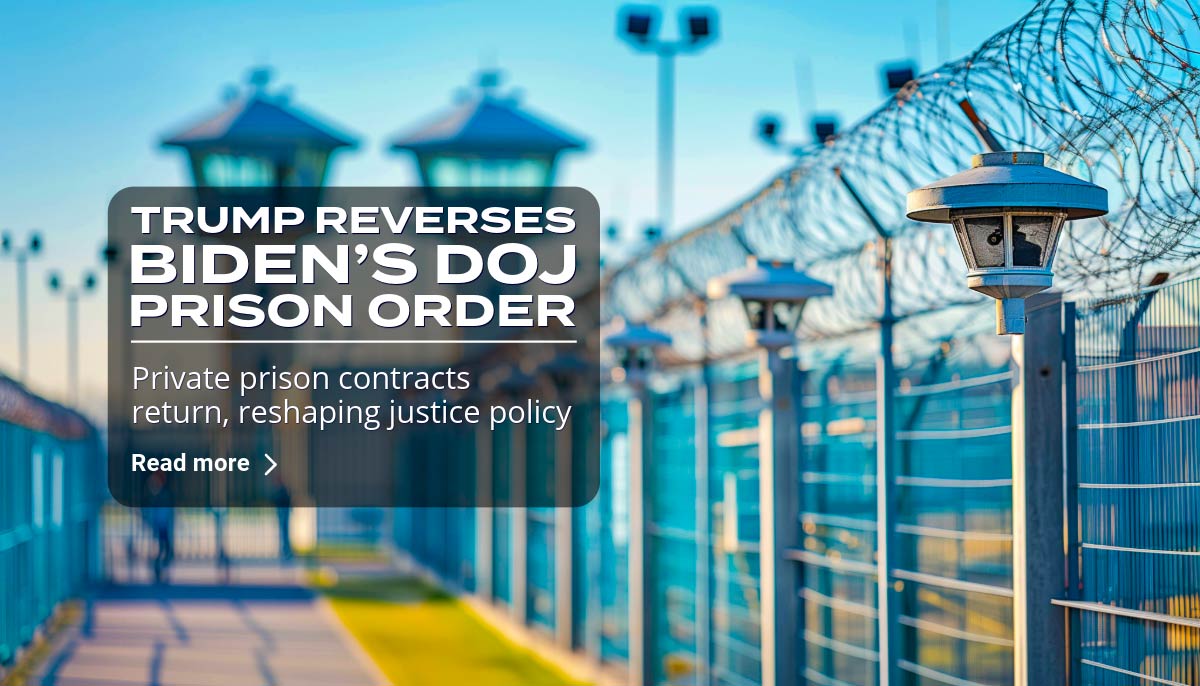
Understanding the Policy Reversal
In early 2025, President Donald Trump announced the reversal of President Biden’s executive order directing the Department of Justice (DOJ) to phase out contracts with private prison companies. This decision reignites long-standing debates on incarceration, federal policy, and the role of profit-driven institutions in the U.S. criminal justice system.
Biden’s 2021 executive order was a cornerstone of his administration’s criminal justice reform agenda. It mandated that the DOJ not renew contracts with privately operated federal prisons, citing concerns about accountability, human rights, and rehabilitation. Trump’s reversal signals a dramatic policy shift, with potential consequences for prison populations, corporate stakeholders, and communities nationwide.
The Rise and Role of Private Prisons in the U.S.
Private prisons emerged in the 1980s amid growing incarceration rates fueled by the War on Drugs and mandatory minimum sentencing. Companies such as CoreCivic and GEO Group expanded rapidly, marketing cost-efficiency and capacity relief for overcrowded public prisons.
However, critics argue that profit motives undermine rehabilitation efforts and incentivize higher incarceration rates. Numerous reports have documented issues ranging from inadequate healthcare to heightened violence, sparking lawsuits and congressional scrutiny.
Biden’s Executive Order: Reform and Accountability
Biden’s order targeted DOJ contracts with private prisons, which accounted for roughly 14,000 federal inmates—about 8% of the Bureau of Prisons’ population. The directive was framed as part of a broader strategy to address systemic racism, reduce mass incarceration, and prioritize transparency, aligning with efforts such as Clean Slate laws and their impact in 2025 that aim to expand second chances for returning citizens.
Key goals of Biden’s executive order included:
- Reducing corporate influence over incarceration policy.
- Promoting public oversight to ensure consistent standards of care and safety.
- Encouraging rehabilitation and reentry programs over profit-driven models.
- Aligning federal policy with calls for racial and social justice reform.
Trump’s Justification for Reversal
Trump’s administration argues that reversing Biden’s policy strengthens security, expands capacity, and supports economic growth in rural communities reliant on prison jobs.
By restoring contracts with private prison operators, the administration emphasizes:
- Operational flexibility to manage fluctuating prison populations.
- Cost savings claims compared to government-run facilities.
- Economic benefits for regions dependent on private prison facilities.
Yet, these justifications remain contested. Numerous independent studies have challenged the notion that private prisons save money, and critics contend that safety and human rights concerns far outweigh alleged efficiencies.
Implications for Inmates and Communities
The return of private prison contracts is expected to impact inmates, correctional staff, and surrounding communities.
- Inmate Welfare: Reports consistently show higher rates of violence and inadequate healthcare in private prisons compared to public facilities.
- Rehabilitation: Privately managed prisons often offer fewer educational and vocational programs, undermining reentry success compared to approaches that emphasize empowering reentry through reintegration and community-based support.
- Community Impact: While private prisons bring jobs to certain regions, they also perpetuate reliance on mass incarceration as an economic model.
- Racial Justice: Because incarceration disproportionately affects communities of color, reinstating private contracts risks deepening existing inequalities.
Corporate Stakeholders and Political Influence
The reversal benefits major private prison corporations that lost lucrative DOJ contracts under Biden. These companies have historically contributed millions in lobbying and campaign donations, shaping federal and state policy landscapes.
Trump’s decision is likely to be celebrated by these firms, whose stock values may see a resurgence as federal contracts are renewed. However, advocacy groups warn that this represents a retreat from accountability and transparency, prioritizing profit over people.
Broader Criminal Justice Context
This reversal must be seen within the wider framework of U.S. criminal justice policy. Despite bipartisan calls for reform, the U.S. remains the world leader in incarceration, with racial disparities in prison admissions and sentencing continuing to shape outcomes in ways that private contracts often exacerbate. Federal decisions on private prisons have ripple effects across states, influencing legislation, litigation, and public opinion.
Reform vs. Profit Tensions
- Reform Advocates push for decarceration, alternatives to imprisonment, and investments in rehabilitation.
- Private Operators emphasize cost efficiency and contractual flexibility, framing themselves as essential to managing prison populations.
The tension between these perspectives underscores ongoing battles over the direction of U.S. justice policy.
The Future of Private Prisons in America
The debate over private prisons is far from over. Trump’s reversal ensures that incarceration policy will remain a political battleground, with future administrations likely to revisit the issue. For reform advocates, the fight continues to prioritize human dignity, equity, and long-term solutions over short-term cost arguments.
The trajectory of private prisons will shape not only inmate experiences but also the broader values of American justice. Whether the nation leans toward reform or reverts to profit-driven incarceration will depend on political will, public pressure, and the outcomes of upcoming elections.
Final Thoughts
The reversal of Biden’s executive order marks a defining moment in U.S. criminal justice policy. It reflects competing visions: one focused on equity and reform, the other prioritizing profit and capacity. As the DOJ reengages with private prison operators, the consequences for inmates, communities, and the justice system will reverberate for years to come.
The challenge ahead lies in balancing security with humanity, cost with accountability, and politics with justice. The stakes are high, and the outcome will define the direction of American incarceration policy for the next generation.












